 Petzlover
Petzlover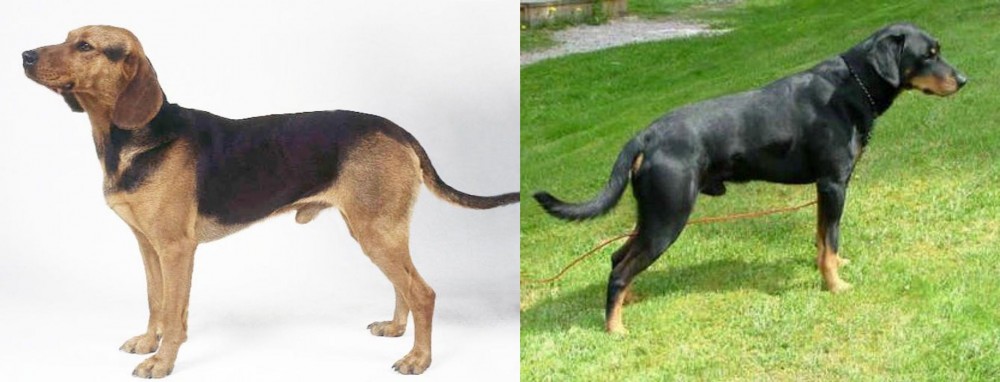 Serbian Hound is originated from Serbia but Smalandsstovare is originated from Sweden. Both Serbian Hound and Smalandsstovare are having almost same height. Both Serbian Hound and Smalandsstovare are having almost same weight. Both Serbian Hound and Smalandsstovare has almost same life span. Both Serbian Hound and Smalandsstovare has almost same litter size. Both Serbian Hound and Smalandsstovare requires Low Maintenance.
Serbian Hound is originated from Serbia but Smalandsstovare is originated from Sweden. Both Serbian Hound and Smalandsstovare are having almost same height. Both Serbian Hound and Smalandsstovare are having almost same weight. Both Serbian Hound and Smalandsstovare has almost same life span. Both Serbian Hound and Smalandsstovare has almost same litter size. Both Serbian Hound and Smalandsstovare requires Low Maintenance.
 Once known as the Balkan Hound, the Serbian Hound is a scenthound, an ancient dog breed that dates back to the 11th century. He has always been a hunting dog, hunting in packs, but today he is essentially a pet and a companion.
Once known as the Balkan Hound, the Serbian Hound is a scenthound, an ancient dog breed that dates back to the 11th century. He has always been a hunting dog, hunting in packs, but today he is essentially a pet and a companion.
Although the breed is very popular in Serbia, they have not spread much outside of the Balkan region. The first description of the Serbian Hound dates from 1905. The first standard for the dog was published in 1924.
This dog isn’t recognized by the AKC but he has been recognized by the FCI in 1940 and in 2006 by the United Kennel Club.
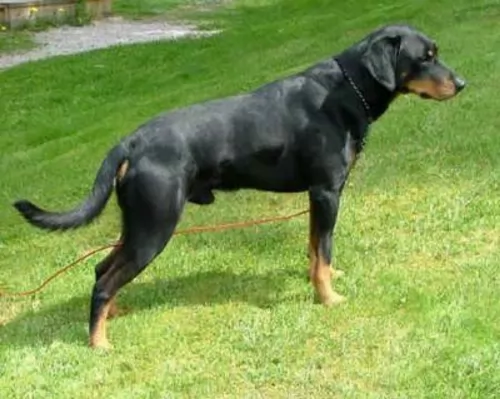 The Smålandsstövare has got quite a long history and dates back to the 1600s. He is the smallest of the Swedish hound breeds. This is a scenthound.
The Smålandsstövare has got quite a long history and dates back to the 1600s. He is the smallest of the Swedish hound breeds. This is a scenthound.
Hounds similar to the Smålandsstövare were bred with European hounds and then brought to Småland and bred with local spitz-type farm dogs to create the foundation stock for the Smålandsstövare.
The dog was used to hunt but nearly died out in the 20th century, but breeders restored it and the first official standard emerged by the Swedish Kennel Club in 1921.
The Smålandsstövare is a rare dog breed but it is recognized by the American Rare Breed Association as well as other major kennel clubs, one of which is the Federation Cynologique Internationale as well as the United Kennel Club.
 The Serbian Hound isn’t a particularly large dog. He is medium sized, standing at between 44 to 56cm in height and weighing in the region of 11 to 23kg. The coat of the dog is a red or tan color with a black saddle.
The Serbian Hound isn’t a particularly large dog. He is medium sized, standing at between 44 to 56cm in height and weighing in the region of 11 to 23kg. The coat of the dog is a red or tan color with a black saddle.
The hair is short, thick and shiny with the hair being slightly longer over the thigh area. The ears are high set, are of medium length and are floppy. The average litter size for these dogs is 3 to 6 puppies.
The good-natured Serbian Hound makes a loving and devoted pet. He’ll get on well with children too. They’re friendly dogs with a relaxed disposition, but to maintain that easy going characteristic, they will need to be well exercised.
They’re intelligent dogs with an independent side to them, and some training and socialization will be recommended.
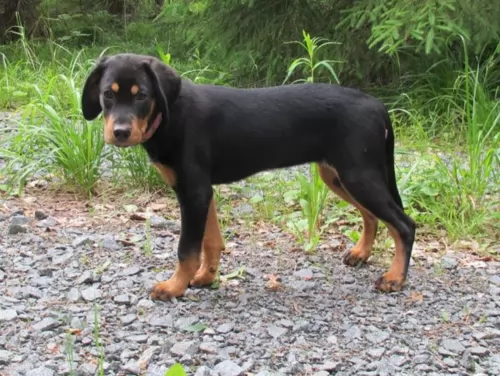 The Smålandsstövare is a muscled, compact looking dog. The double coat is shortish to medium length and is thick and quite coarse to the touch. He sheds seasonally. The coat is usually black with tan markings.
The Smålandsstövare is a muscled, compact looking dog. The double coat is shortish to medium length and is thick and quite coarse to the touch. He sheds seasonally. The coat is usually black with tan markings.
The high set ears are medium length and floppy, the head is slim and the tail can be naturally short. Sometimes the tail is long and can be slightly curved in the spitz-like sabre fashion.
The eyes are brown and friendly. The height of these dogs is about 46 to 54cm and he weighs anything from 15 to 18kg.
Usually a well behaved, quiet, calm, gentle dog, the Smålandsstövare takes his role as guard dog seriously, wanting to protect his family.
His good temperament ensures he gets on well with all members of the family. He is full of energy and will need to be exercised well, whether it be ball games in the garden, a walk around the block, a run in the park or joining his family on hikes and camping trips.
It is why he won’t settle down well on a small property in the city. He needs larger premises to expend his energy, and if in cramped premises without exercise, he may resort to barking and whining and this may well drive your neighbors bats.
Training and socializing your Smålandsstövare will be necessary and it should be easy as he is intelligent.
 The Serbian Hound is a working dog that just loves being busy, and he can keep busy for a long time as he has plenty of stamina.
The Serbian Hound is a working dog that just loves being busy, and he can keep busy for a long time as he has plenty of stamina.
He is an easy going dog, laid back, social and lively as well as being loving and loyal. They’re independent and strong-willed as well as being intelligent. You shouldn't have any difficulty training and socializing him, and it will round your pet off nicely, making him an even better companion and pets.
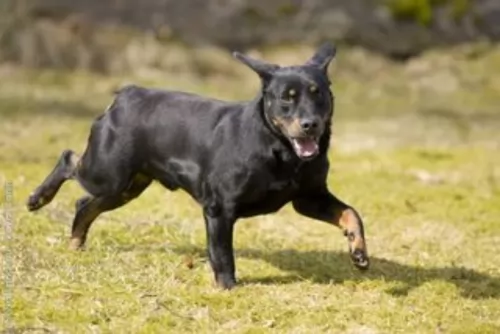 The Smålandsstövare is a robust dog with a lot of stamina. He will be wanting a lot of exercise and is ideal as a pet in the suburbs or the countryside but not ideal for city living.
The Smålandsstövare is a robust dog with a lot of stamina. He will be wanting a lot of exercise and is ideal as a pet in the suburbs or the countryside but not ideal for city living.
He makes a wonderful family pet, forming strong bonds with his owners. He makes an excellent watchdog too wanting to protect his family, and with this amicable, calm dog, you’re going to have a true friend.
 Your Serbia Hound can live to be 12 to 15 years of age, but just like with other dogs, he will need to be watched for some of the common dog diseases there are. Cancer, bloat, skin infections and kennel cough are all diseases to look out for.
Your Serbia Hound can live to be 12 to 15 years of age, but just like with other dogs, he will need to be watched for some of the common dog diseases there are. Cancer, bloat, skin infections and kennel cough are all diseases to look out for.
Ear infections are common in dogs with floppy ears. You need to check inside your dog’s ears as an ear infection can be a painful condition. You’ll see your dog scratching at his ears and shaking his head.
Most ear infections are caused by bacteria and yeast or even ear mites. You can’t play around with an ear infection and the veterinarian will take a sample from the affected ear. Most people don’t like to fiddle around with the inner ear and prefer to leave this grooming part to the vet or a professional groomer.
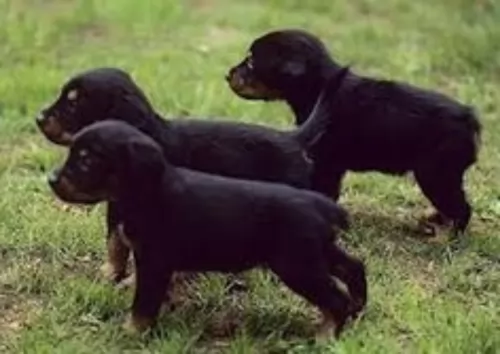 The Smålandsstövare is a rare dog breed and not much is known about congenital conditions to which he may be particularly prone.
The Smålandsstövare is a rare dog breed and not much is known about congenital conditions to which he may be particularly prone.
With good care he can reach 14 or 15 years of age. The floppy ears put him at risk for ear infections, while other conditions to watch for include hip dysplasia, cancer, bloat and obesity.
If you see your dog shaking his head or pawing at his ears, look inside because the ears may be red and inflamed. It is important to get help quickly for ear problems in dogs.
Ear canals are sensitive so if you don’t want to clean the ear and work on it yourself it is important to get your pet to the vet. The vet will clean your dog’s ears and also prescribe antibiotics.
For future treatment, you will need to clean your dog’s ears and keep them dry. If you don’t want to do this yourself, make sure to get him to professional groomers who will do this for you.
 Serbian Hounds with their short coats are low maintenance. Yes, they do shed throughout the year, and have some seasonal shedding. A good brush twice a week will be adequate for this dog.
Serbian Hounds with their short coats are low maintenance. Yes, they do shed throughout the year, and have some seasonal shedding. A good brush twice a week will be adequate for this dog.
Check your Serbian Hound’s ears and eyes for infection. Also, as you brush him, take note of any new or unusual lumps you come across.
As a medium-sized dog, if you choose to feed your dog kibble, it will need to be according to size, his age and activity levels. Read the labels carefully to make sure you know how to feed your Serbian Hound the best way.
Choose kibble that has a good selection of vitamins and minerals in it. Try and provide your pet with some home made food too and add it twice a week to the dry kibble to give him some variety and a tasty treat.
Boiled chicken, brown rice, sweet potatoes, carrots and spinach are simple foods – good for a dogs digestion. By also adding a bit of raw meat to his food you help him maintain a healthy coat and skin.
As a hunting breed, this dog has a lot of stamina and energy. He is going to require a good deal of exercise every day. Walks are always a good thing but he’ll want more energetic action – runs, ball games and some swimming.
Toys and equipment that can provide him with mental stimulation will be good for him too as he is a mentally sharp dog.
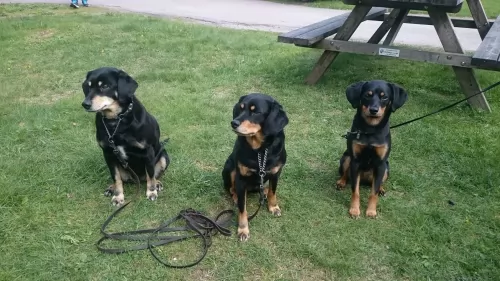 Choosing a good diet is imperative for the Smålandsstövare. Choose a commercially manufactured dog food high in vitamins and minerals.
Choosing a good diet is imperative for the Smålandsstövare. Choose a commercially manufactured dog food high in vitamins and minerals.
Give your dog a treat by providing him with some home-made food. It can be added into the dry kibble about twice a week as a treat. Boil brown rice and chicken in a pot and add in sweet potatoes, carrots and spinach. Chop all this up and give it to your dog in small portions. Also try to include some raw meat into the diet.
The Smålandsstövare is a very energetic breed and he is going to require some vigorous exercise every day. Take him for walks, allow him to run with you when you cycle or jog or take him swimming.